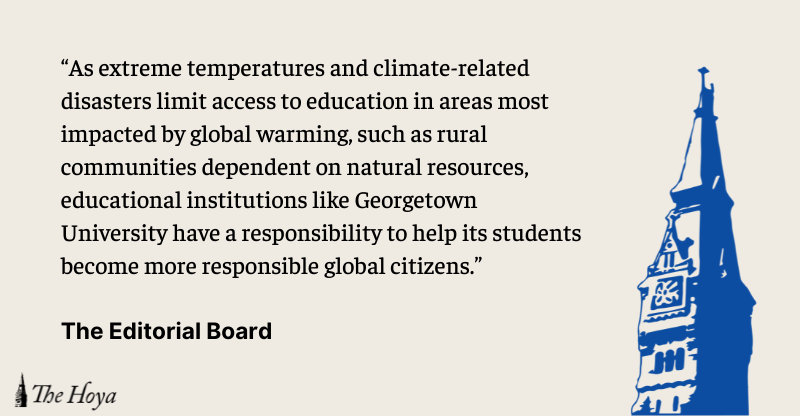This week, Georgetown University students registered for spring 2022 classes. Among the myriad considerations students take when constructing their future schedule is the core curriculum. The core curriculum is an instrumental part of a Georgetown education and guides every student to develop skills that engage with particularly important topics.
The Editorial Board calls on the university to implement an environmental attribute, similar to the engaging diversity requirement, in the university’s core curriculum to ensure all students take steps to learn about the environmental issues that will increasingly define the world we live in.
As extreme temperatures and climate-related disasters limit access to education in areas most impacted by global warming, such as rural communities dependent on natural resources, educational institutions like Georgetown have a responsibility to help its students become more responsible global citizens.
Climate change inherently affects every industry, so requiring students, regardless of their major, to take courses with the attribute is imperative.
Education on climate change is the first step toward solving climate change and decreasing the disproportionate impact of changing climates on women and communities of color, who bear the brunt of natural disasters and are least prepared to address environmental degradation. Implementing an environmental requirement would align with Georgetown’s missions of creating engaged and responsible global citizens who “care for our common home.”
There is no doubt environmental issues demand the attention of Georgetown students.
Though each undergraduate school’s core requirements vary, Georgetown’s universitywide core curriculum mandates have the same goal: making sure all students have a well-rounded education and “engage responsibly in the world.”
The university can implement the attribute to recognize the breadth of environmental issues. Students could not only fulfill their requirement by taking environmental science but also pursue intersectional courses such as “Environmental Sustainability Operations and Business Management” in the McDonough School of Business, “Gender and Sustainability” in the College, “Environmental Policy” in the School of Foreign Service (SFS) and “Urbanization, Health, and Environment” in the school of Nursing and Health Studies. Such flexibility will allow students from all schools to find courses focused on environmental issues that relate to their field of interest.
However, students and administrators understandably have reservations, according to Adrian Ali-Caccamo (SFS ’24) and Rachel Klein (SFS ’24), representatives of the Class of 2024 on the SFS Academic Council.
“Our perception of the core, based on our direct interactions with SFS students, is that the core is not inherently too extensive but feels overbearing because some interpretation of the meaningfulness has been lost,” Ali-Caccamo and Klein wrote in an email to The Hoya.
This concern is valid, but requiring students to take courses with an environmental attribute while allowing the attribute to overlap with other existing core requirements addresses the worry. This method would allow students to fulfill their environmental requirement while also fulfilling a major, minor or other core requirement.
Currently, the university allows students to fulfill multiple core requirements with a single class. Although there are exceptions, such as the humanities: arts, literature and culture (HALC) requirement, which prohibits overlaps, classes with the engaging diversity designation can be taken to fulfill other major, minor or core requirements. While the engaging diversity attribution falls short of its purpose, this shortcoming should not rule out the more careful implementation of an environmental attribution core requirement. Carefully reviewing courses with the attribution while establishing the requirement with this model would make it easy for students to learn about climate change without adding on another stand-alone requirement.
“Adding an environmental requirement to the core, in our opinion, could fit as an attribute for relevant courses in multiple departments,” Ali-Caccamo and Klein wrote.
Requiring students to take a course with the attribute would strengthen each student’s understanding of climate change and prepare them to address pertinent environmental issues.
Georgetown’s Office of Sustainability already compiles inventory lists of courses related to sustainability. The most recent list, which contains about 300 courses offered in recent years, can be used as a reference for courses eligible for the environmental designation.
The university has no current plans to implement an environmental attribution, according to a university spokesperson.
“Ultimately, it is the hope of the University that the entirety of a Georgetown education will prepare students to embody certain life-long habits: participating creatively in an intellectual community, addressing complex issues and problems, developing a worldview that is both intellectually grounded and personally compelling, and engaging responsively in the world,” the spokesperson wrote.
Climate change will bring an unprecedented breadth and depth of issues that will permeate every facet of our lives. To accomplish the goals of the core as explained by the university, it is crucial all students encounter coursework that engages with environmental issues.
Georgetown students are eager to take on profound challenges like climate change, and the university should do all it can to support students to do so.
The Hoya’s Editorial Board is composed of six students and is chaired by the Opinion editors. Editorials reflect only the beliefs of a majority of the board and are not representative of The Hoya or any individual member of the board.














